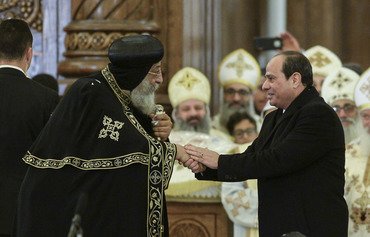CAIRO -- Egypt's Coptic Christians are this year welcoming the return of the country's main Coptic Christmas Mass, which will be held Thursday (January 6) evening, after it was cancelled last year amid the COVID-19 pandemic.
Strict measures will be taken to ensure there is no overcrowding, as a precautionary measure to protect the congregation against the virus.
The main Christmas celebration of the Coptic Orthodox Church is to be held for the second time in the Nativity of Christ Cathedral in the new administrative capital. The cathedral was inaugurated in 2019 amid heavy security.
Egyptian President Abdel Fattah al-Sisi ordered the construction of the largest mosque and largest church in the country in January 2017 in the aftermath of a deadly December 2016 attack on Cairo's St. Peter and St. Paul Church.
![Egyptian President Abdel Fattah al-Sisi with Pope Tawadros II at the 2019 inauguration of the Nativity of Christ Cathedral. [Coptic Orthodox Church]](/cnmi_am/images/2022/01/04/33314-tawadros-sisi-2019-600_384.jpg)
Egyptian President Abdel Fattah al-Sisi with Pope Tawadros II at the 2019 inauguration of the Nativity of Christ Cathedral. [Coptic Orthodox Church]
![A night view of the Nativity of Christ Cathedral in Egypt's new administrative capital. [Presidency of the Republic]](/cnmi_am/images/2022/01/04/33316-nativity-christ-cathedral-600_384.jpg)
A night view of the Nativity of Christ Cathedral in Egypt's new administrative capital. [Presidency of the Republic]
At least 25 people were killed and many others were wounded when a bomb exploded in the church, adjacent to St. Mark's Coptic Orthodox Cathedral.
The "Islamic State of Iraq and Syria" (ISIS) claimed responsibility for the attack, and for a string of other attacks on Egypt's Christians.
Al-Sisi ordered the construction of the two edifices in the new administrative capital to stand as symbols of co-existence and national unity.
The Rev. Sameh Iskandar of Mar Mina Church in Giza said Christmas Eve (January 6) attendance will be limited to 2,050 people -- 25% of the cathedral's total capacity -- as a precautionary measure due to COVID-19 concerns.
Similar measures will be enforced in all churches in Egypt, he said.
In addition to members of the congregation with reserved seats, the ambassadors of a number of countries will attend the Divine Liturgy, along with a number of political, security and spiritual leaders.
Pope Tawadros II of Alexandria will lead the service.
Coptic-affiliated scout troops will enforce precautionary measures at the main entrance to the church, according to scout official Peter Naeem.
These will include taking the temperature of those who enter the church, and ensuring masks are worn, hands are disinfected and social distancing is maintained inside the church, he said.
Security will be entrusted to the Ministry of Interior, whose specialised teams will verify the names of the invitees and fully secure the church and its surroundings.
A symbol of co-existence
Naeem said consultations are taking place regarding the participation of Muslim youth in tasks to be carried out by scout troops "as a message of love and friendship among the Egyptian people".
In recent years, scout troop activities were periodically suspended because of strict security measures implemented to protect churches from terrorist attacks.
This year, however, the increase in the tasks to be carried out by scout troops inside and outside the cathedral -- and in all churches -- is expected to have a positive effect in the country, he said.
Naem said it would be a "clear message that the war on terrorism has paid off and things are back to normal".
"The celebration of Christmas in the Nativity of Christ Cathedral this year is a special and significant symbol," said private school teacher Kyrillos Magdy.
It is symbolic "not only for Egypt's Christians but also for Muslims and all Egyptian state institutions", he said.
Magdy noted that the cathedral was built during a period of terrorism in Egypt, which threatened the unity of the Egyptian people.
The cathedral's location -- in the heart of the new capital -- also is significant, he said, as the capital has become a global symbol of the Egyptian leadership's efforts to advance and develop the country.
Magdy said the construction of the cathedral was a strong response to rumours that terrorist groups tried to circulate, which aimed to portray Egyptian society as anti-Christian.
The Nativity of Christ Cathedral is the largest church in the Middle East, and occupies 63,000 square metres in a prominent location to the south of the central park in the new administrative capital.
It can accommodate more than 8,000, serves as the newest papal headquarters, and contains a museum dedicated to the history of the Coptic Church.
Christians make up about 10% of Egypt's population, with Copts accounting for around 90% of that number.

![Pope Tawadros II converses with a group of Coptic scouts in the Nativity of Christ Cathedral. [Coptic Orthodox Church]](/cnmi_am/images/2022/01/04/33313-tawadros-scouts-cathedral-600_384.jpg)




